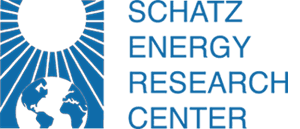
Background
Schatz Energy Research Center (SERC) was founded in 1989 by Environmental Resource Engineers, Dr. Peter Lehman and Dr. Charles Chamberlin at Cal Poly Humboldt, located in Arcata, CA. The center was named after Dr Louis W. Schatz, who funded SERC and had a passion for hydrogen and fuel cells. In 1998, Dr. Schatz's passion was turned into action as SERC debuted the country's first street-legal hydrogen-powered car.
What SERC Does
SERC has a variety of services to get the word out about their environmentally sustainable practices and technology. Besides conducting rigorous research, they offer educational outreach programs at schools (grade school through the collegiate level). The center also holds various community outreach projects, one of which attempts to transition Humboldt County (where SERC is located) to having full energy independence by 2030. SERC also facilitates fuel cell research, which is a technique for storing and transporting power using hydrogen (like a battery). They also make and sell fuel cell testing stations for the hydrogen technology. SERC also helped build Cal Poly Humboldt's hydrogen fueling station, which fuels hydrogen-powered vehicles designed and manufactured by Toyota. Schatz has a lease with the car company to test end educate the public on the hydrogen car technology. The Schatz Center also offers unbiased third-party opinions on various environmentally sustainable technology used around the world. SERC lastly is also part of International projects that bring energy efficient technologies to developing nations.
SERCS's Most Recent International Projects
SERC works with professionals, undergraduate, and graduate students to help with third world energy needs. Projects the center has worked on for various developing nations are: installing energy-efficient lighting systems, creating off-grid solar energy systems, mini-grid management, and conducting energy testing and education.
Lighting Africa
Since 2008, Schatz has worked closely with the Lighting Africa initiative (part of the World Bank Group based in Washington D.C.) to develop practical and efficient lighting systems for third world Africa. Most of their work has been in researching, developing, and testing LED-based off-grid lighting systems. The endeavors of Lighting Africa and SERC have traveled to multiple places around the world such as Canada, Mexico, various countries in Central America, and even around Europe! Their latest lighting project has recently launched in India by developing a solar energy market, which provides energy to millions of Indians who have little to no electric power. This truly is a wide-scale project!
Bhutan GridShare
Like in Africa and India, SERC has been bringing lighting systems to rural villages in Bhutan. During peak hours of electricity uses (usually in the late afternoon to early evening when villagers use rice cookers), many in Buhtan experienced brownouts, where voltage drops. This causes lights to dim and other electric powered appliances to flicker and malfunction. GridShare is a fairly cheap solution to brownouts, by regulating users and their power usages. A village's power source is connected to a grid that distributes power to different users at different times of the day. This not only reduces brownouts, but furthermore encourages villagers to share electric devices, therefore lowering the usage and the amount of electricity required in a given day. Even though villagers have to constantly share power, the GridShare system is set up so that no matter hat time of day it is, each of its users will always have a base load to power essential appliances, such as lights, radios, televisions, and mobile phone chargers. There is also an educational component to the GridShare system, which allows users to learn and understand how electricity is transferred and why brownouts occur, which furthermore encourages appliance sharing and overall conservative energy usage in Bhutan.
Getting the Word Out There
SERC and its partners are clearly doing revolutionary things around the world. Although not yet a globally known organization, SERC's gaining popularity is certainly recognized by Cal Poly Humboldt, Humboldt county, and immediate surrounding communities. Their efforts have been recognized by local newspapers, such as the Times Standard. Digital weekly newsletters and bi-annual magazines from Cal Poly Humboldt also feature Schatz's current endeavors and projects.